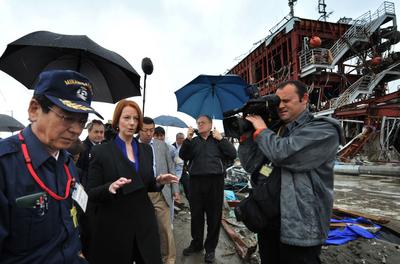The stated intention of the Japan–Australia ‘strategic partnership’, and the TSD, is to build cooperation on non-traditional security challenges, such as disaster relief, piracy and climate change, but there are those, especially in Beijing and Pyongyang, who view this maritime pact as part of their own ‘containment’.
Australian Prime Minister Julia Gillard made Japan the first stop on her recent tour of Asia this April, which included South Korea and China. The visit appears to have been a success, with significant reciprocal good will. During her visit (the second in ten months), she toured the tsunami-stricken areas of Japan, met the Imperial Family, delivered a number of policy speeches and gave press conferences with her Japanese opposite, Naoto Kan. In a reaffirmation of former PM John Howard’s earlier proclamation, she described Japan as ‘Australia’s closest partner in Asia’, and highlighted the strong mutual ties between the two nations. She pointed to a compound of shared values and interests as the basis for the Japan–Australia strategic partnership. Both countries are liberal democracies, supporting freedom, human rights and rule of law. They have shared economic and strategic interests, on matters such as terrorism, WMD proliferation and nuclear disarmament. North Korea was singled out as a particular cause for concern, and as a catalyst for closer bilateral security cooperation, in tandem with the TSD.
Since the landmark 2007 Declaration, building of the strategic partnership has continued apace, with an Acquisition and Cross-Servicing Agreement, designed to increase military interoperability between the forces of the two countries, recently passed into law by the two parliaments. In Tokyo, Gillard spoke of the next steps in deepening this cooperation through an Information Sharing Agreement and joint military exercises. Both countries also currently lead efforts against proliferation through their joint chairmanship of the International Commission on Nuclear Non-proliferation and Disarmament. The intention, she said, was to enter ‘a new phase of more frequent, practical and ambitious bilateral security cooperation’.
The partnership was reinforced by Australia’s prompt and significant assistance to Japan in the aftermath of the tsunami, including rescue teams and equipment for stabilising the crippled Fukushima nuclear plant. In light of the disaster, both countries vowed to cooperate on developing clean and renewable energy. Gillard also pledged Australia to be a reliable supplier of energy resources (coal and liquid natural gas) and rare earth metals, vital to Japanese manufacturing. Both countries indicated their continued engagement in the regional architecture of the Asia Pacific, such as the East Asia Summit and the ASEAN+8 Defence Ministers Meetings. Absent from the discussion was talk of either an ‘Asia Pacific Community’ or an ‘East Asian Community’ — Australian and Japanese initiatives that have been quietly dropped by the current prime ministers. Lastly, support for Japan’s aspirations to permanent membership of the UN Security Council was ritually reaffirmed by Ms Gillard.
There were, however, some clouds over this otherwise rosy outlook for bilateral cooperation. Pundits were quick to raise the ‘whaling issue’ as a potential point of friction. Australia has recently lodged a case against Japanese whaling violations in the International Court of Justice. Mr Kan quarantined the issue from the overall progress in bilateral relations, stating that it would not impact on the strategic partnership. Another difficulty for the partnership has been the painfully-slow progress of negotiations toward a bilateral free trade agreement (FTA). Japan announced that it would postpone its involvement in the regional Trans-Pacific Partnership (TPP), which makes the prospects for early agreement on the FTA rather dim. Given the impact of the recent natural disaster in Japan, this is understandable.
How do the other major powers in the region view the re-blossoming Australia–Japan relationship? Certainly their joint ally the US looks on approvingly. The increased bilateral security cooperation, superintended by the TSD, links two of the most important ‘spokes’ of the US ‘hub and spokes’ alliance network in the Asia Pacific. But if Washington is satisfied, Beijing takes asomewhat dimmer view, long having publicly denounced ‘military alliances’ in the region as unproductive. What Australia, Japan and the US consider a contribution to security and stability in the region, China views uneasily as its impending ‘containment’ or ‘encirclement’. The maritime clash between Japanese Coast Guard and Chinese fishing trawlers last September, and subsequent suspension of supplies of rare earth metals by Beijing, served notice to Japan of the widening disconnect between its national economic and strategic interests. Australia too shares this dilemma, with its economy highly dependent on China, but its strategic interests aligned with those of Japan and the US. This dilemma looks set to deepen in the future, and the Japan–Australia strategic partnership, along with the TSD, may be seen as a valuable insurance policy.
Thomas Wilkins is Lecturer at the Centre for International and Security Studies, University of Sydney.

